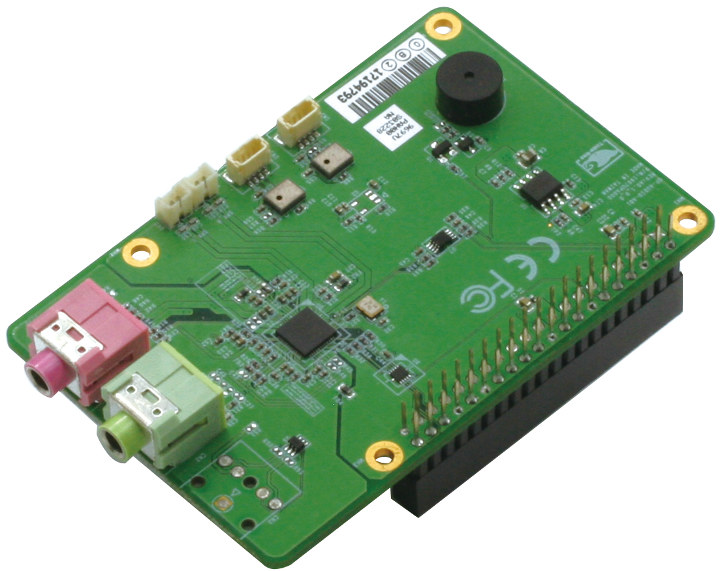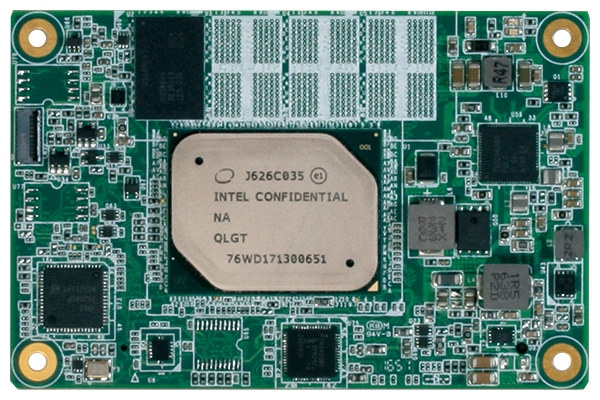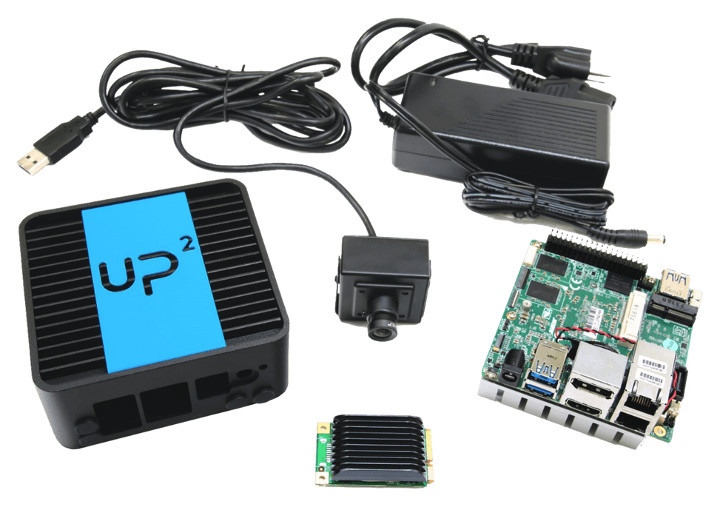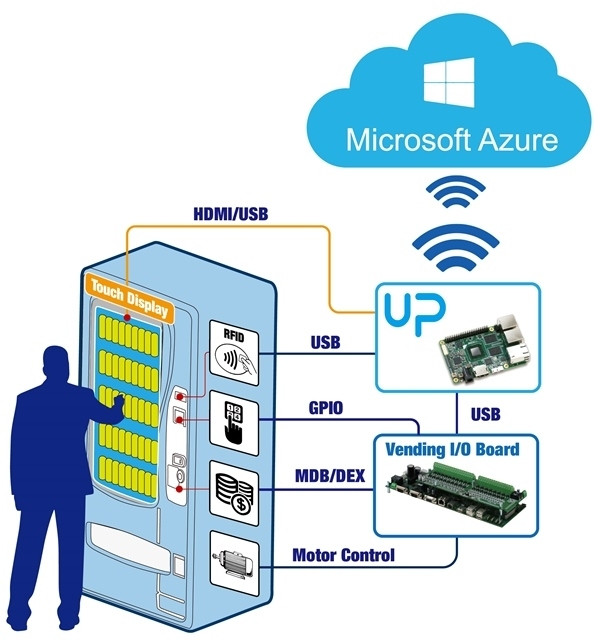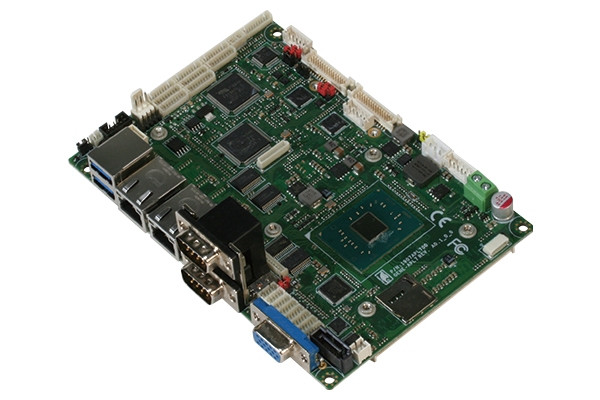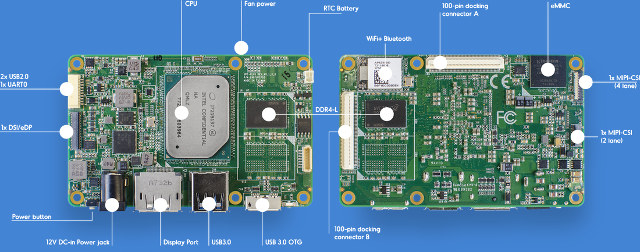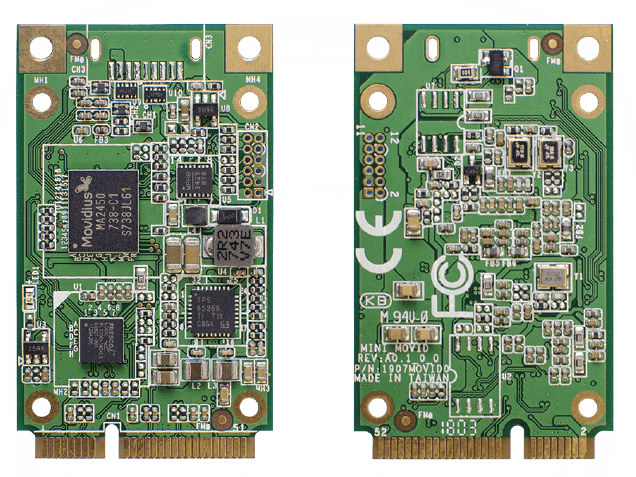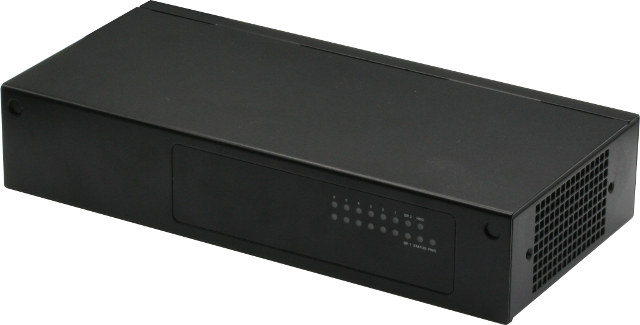AAEON has announced three add-on boards for their Intel based UP board (Cherry Trail) and UP Squared board (Apollo Lake): UP-AUDIO HAT – Features external ports for a microphone and speakers/headphones UP-CAMERA HAT – Comes with two FPC/FFC connectors for 2M security camera UP-POE HAT – Adds WAN and LAN Gigabit Ethernet ports and PoE support UP-AUDIO HAT AAEON’s UP-Audio HAT currently only works with UP board, and features the following: Audio Codec – Realtek ALC5672 3.5mm Audio Jacks – 1x Line out, 1x MIC Headers – 2x speaker Built-in Components – 2x digital microphones, 1x buzzer Connects to board via 40-pin GPIO female header Dimensions – 85 mm x 56 mm The board is supported in Windows 10, Android 6, and Ubuntu 16.04. UP-CAMERA HAT The camera board works with UP Board, UP Squared and UP Core boards. UP-CAMERA HAT specifications & features: 2x MIPI CSI-2/ DSI DPHY Re-timer […]
NanoCOM-APL Apollo Lake COM Express Module is Designed for Machine Vision & Factory Automation
AAEON has just launched NanoCOM-APL, a Type 10 COM Express module based on Intel Apollo Lake Atom, Celeron, or Pentium processor with up to 8 LPDDR4 memory, and on-board support for dual MIPI CSI interfaces. The module is designed for machine vision and factory automation, and also features Gigabit Ethernet, optional on-board eMMC flash, PCIe x4, ten USB interfaces, and more. NanoCOM-APL Apollo Lake COM Express Module There are currently three variants of NanoCOM-APL module with the following specifications specifications: SoC NANOCOM-APL-A10-0001 – Intel Pentium N4200 quad core Apollo Lake processor @ 1.10 / 2.50 GHz with Intel HD Graphics 505; 6W TDP NANOCOM-APL-A10-0002 – Intel Celeron N3350 dual core Apollo Lake processor @ 1.10 / 2.40 GHz with Intel HD Graphics 500; 6W TDP NANOCOM-APL-A10-0003 – Intel Atom x7-E3950 quad core Apollo Lake-I processor @ 1.60 / 2.00 GHz with Intel HD Graphics 505; 12W TDP System Memory – […]
UP AI Edge Enables Artificial Intelligence on the Edge with Intel CPU, GPU, VPU and FPGA Solutions (Crowdfunding)
Back in February of this year, AAEON introduced their UP AI Edge family of products with UP AI Core mini PCIe card based on Intel Movidius Myriad 2 VPU (Vision Processing Unit), and UP Core Plus board powered by a choice of Apollo Lake processors, and supporting AI Plus FPGA and AI Net Ethernet expansion boards. The company has now launched a Kickstarter campaign for those boards, and added several new products including Vision Plus with three Movidius Myriad 2 VPUs, AI Core M2 with two Movidius Myriad2 VPU in M.2 2280 form factor, as well as the Up Squared AI vision development kit for OpenVINO toolkit. I won’t go through the products announced in February, but let’s have look at the new boards and cards. Vision Plus Board Vision Plus Specifications: VPU – 3x Intel Movidius Myriad 2 VPUs with 512 MB DDR Connectivity – 1x Gigabit Ethernet USB […]
AAEON Releases an Intelligent Vending Machine Development Kit based on UP Board
UP board is a low cost development board powered by an Intel Atom x5-Z8350 Cherry Trail processor with 1GB to 4GB RAM, and 16 to 64GB eMMC flash that mostly follows Raspberry Pi 3 form factor. AAEON is now offering an “intelligent vending development kit” featuring UP board together with a vending machine controller (VMC) board, a motor for the machine’s internal mechanisms, a camera, a QR Code device, and all the necessary cables, as well as optional WiFi and Bluetooth modules. Some details about AIOT-MSSP01 Mini SSP Vending control board: “Intel Intelligent Vending Based” Motor Control – 24V or 12V, Supports GPIO, DC, PWM Type, Supports up to 160 DC Motors Support LCD and Keypad Feature I/Os Vending machine specific interfaces / standards 1x MDB (MultiDrop Bus) 1x DEX (Digital EXchange) 1x Protocol A (EXE) 1x 1-WIRE 4-channel ADC x 1 4-channel Relay GPIO for 12V & 5V by […]
AAEON GENE-APL7 3.5″ Intel Apollo Lake Board Features Up to 12 COM Ports and 10 USB Slots
If you have an application requiring a relatively powerful – yet low power – and compact platform, and plenty of USB and/or serial ports (COM ports), AAEON GENE-APL7 might just be ideal. The 3.5″ subcompact board is powered by an Intel Pentium N4200 or Celeron N3350 processor with a SO-DIMM slots, some video/display outputs, two USB 2.0 ports, eight USB 2.0 interfaces, and up to 12 COM ports. AAEON GENE-APL7 board specifications: SoC (one or the other) Intel Pentium N4200 quad core Apollo Lake processor @ with Intel HD Graphics; 6W TDP Intel Celeron N3350 Apollo Lake processor with Intel HD Graphics; 6W TDP System Memory – 1x DDR3L-1866MHz SODIMM up to 8GB Storage – SATA 3.0 interface, 1x mSATA slot (full size) for SSD Video Output / Display I/F VGA, 2-ch 24-bit LVDS1, optional LVDS2/eDP 12V/2A backlight inverter supply Audio – High Definition Audio Interface, optional 2W Amplified Connectivity […]
UP Core Plus Board To Support AI Plus FPGA and AI Net Ethernet Expansion Boards
We’ve just written about UP AI Core mPCIe card part of the new AI Edge family from UP Board, but other members will soon be released including UP Core Plus board, that builds upon UP Core Cherry Trail board launched last year, with a choice of Intel Atom x5/x7, and Celeron/Pentium Apollo Lake processors. The form factor is different, but just like the first UP Core board, the Core Plus board supports expansion boards via docking connectors such as the Net Plus Ethernet expansion, and the AI Plus expansion board with Intel Cyclone 10 GX FPGA. UP Core Plus specifications: SoC (one or the other) Intel Atom x5-E3940 (2M Cache, up to 2.00 GHz) Intel Atom x7-E3950 (2M Cache, up to 2.00 GHz) Intel Celeron N3350 (2M Cache, up to 2.50 GHz) Intel Pentium N4200 (2M Cache, up to 2.50 GHz) System Memory – 2GB, 4GB or 8GB on-board DDR4L-2400 […]
$70 UP AI Core mini PCIe Card Features Intel Movidius Myriad 2, Supports Tensorflow and Caffe Frameworks
AAEON’s Up Board has given us some affordable Intel development boards over the years with products such as the Cherry Trail based UP Board, or Apollo Lake powered UP Squared board among others, that are competitively priced against equivalent Arm development boards. The company has now launched a new UP AI Edge family, which will include hardware based on Intel Altera FPGA or Intel Movidius VPU (Vision Processing Unit). Their first product is based on the latter, more exactly Movidius 2 2450 VPU, and instead of being a standalone board, UP AI Core is a mini PCIe card that can fit into any 64-bit Intel board or computer. UP AI Core card specifications: SoC – Intel Movidius Myriad 2 2450 VPU System Memory – 512MB DDR SDRAM Mini PCIe edge connector Dimensions – 51 x 30 mm Host computer/board requirements System Memory – 1GB RAM or more Storage – 4GB […]
AAEON FWS-2360 Denverton Desktop Network Appliance Supports up to 6 Ethernet Ports, SATA Storage
Last summer, we started to see products and motherboards based on Intel Atom C3000 series Denverton SoC, including GIGABYTE MA10-ST0 server motherboard and Axiomtek NA362 network appliance with up to 10 LAN ports. AAEON has informed me they’ve launched their own Denverton network appliance with AAEON FWS-2360 equipped with a pair of fiber/copper SFP GbE ports, four GbE ports and two Mini-card slots to accommodate WiFi and 4G LTE expansion. The device also comes with an mSATA socket and a 2.5” SATA bay for storage. AAEON FWS: SoC (one or the other) Intel Atom C3308 dual core Denverton processor @ 1.60 / 2.20 GHz with 4MB cache; 9.5W TDP Intel Atom C3558 quad core Denverton processor @ 2.20 GHz with 8MB cache; 16W TDP System Memory Dual core – 1x DDR4 SODIMM ECC DIMM Quad core – 2x DDR4 SODIMM ECC DIMM Storage – On-board eMMC flash up to […]


